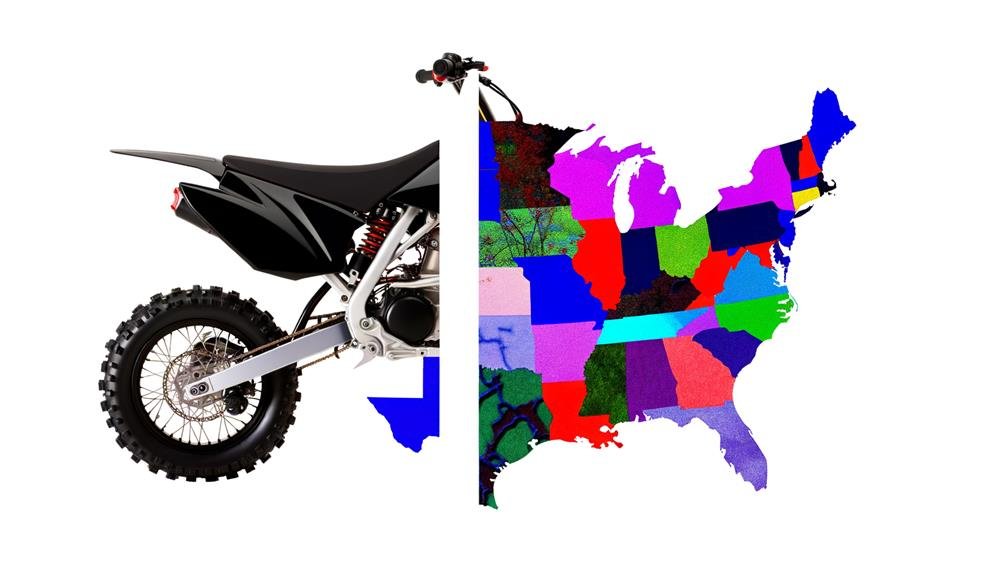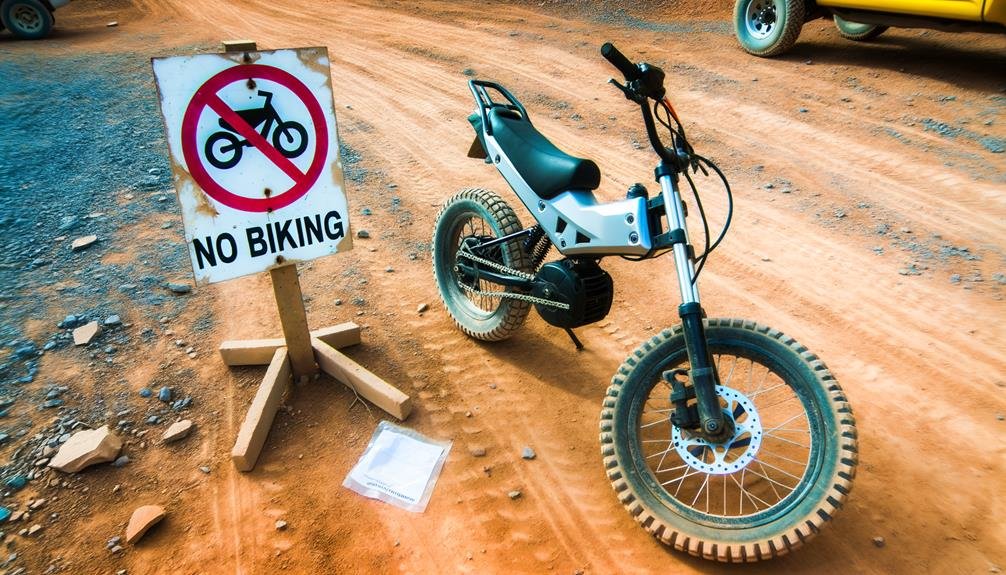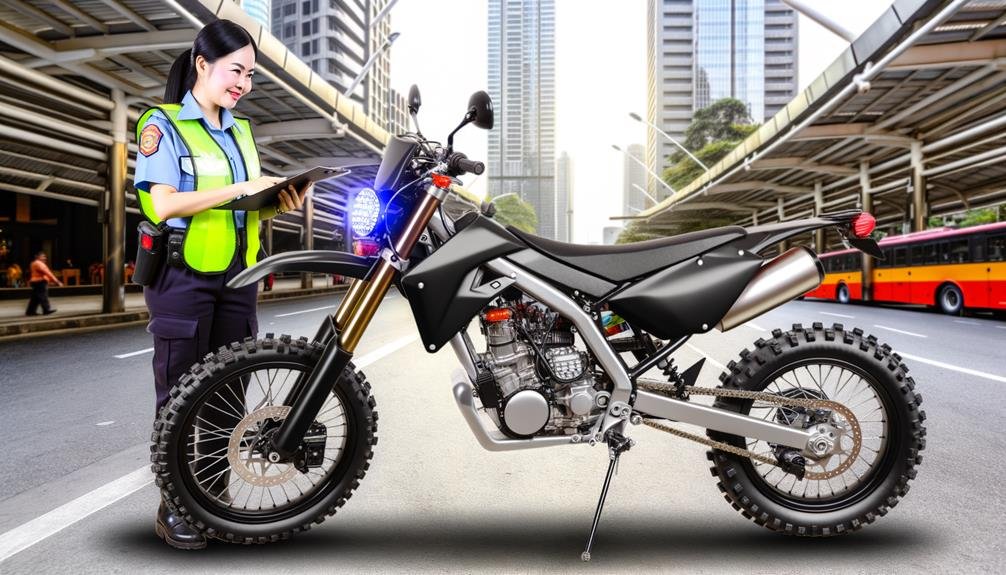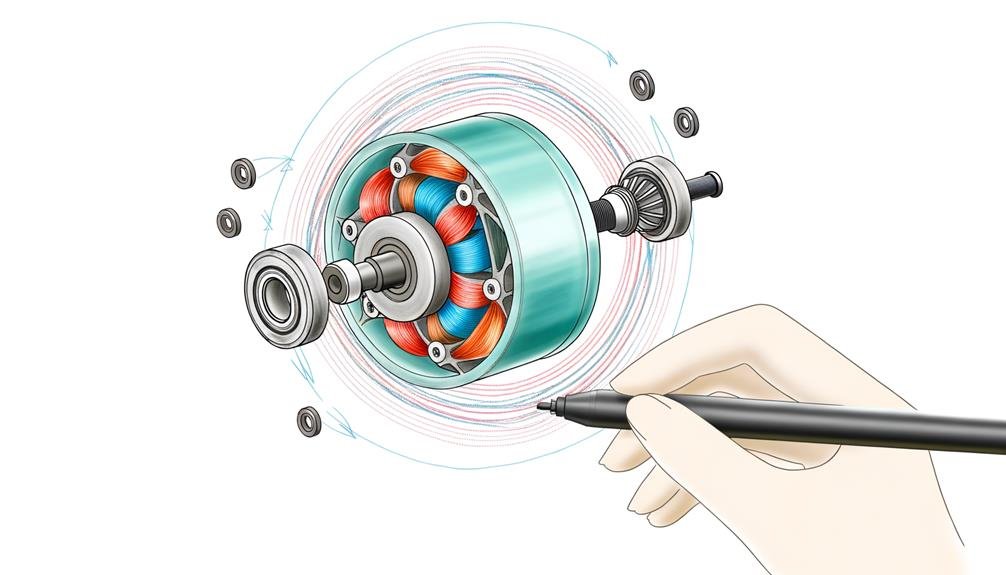Charles Miller is a veteran bike enthusiast with over 12 years of experience dealing with bikes as a mechanic. Despite immense love and expertise for...
In the realm of thrilling adventure and stringent law enforcement, lies the question of legality surrounding the use of electric dirt bikes.
As we venture into this complex topic, we'll explore the key factors that influence the need for a license to ride an electric dirt bike. The answer isn't as straightforward as you might think, with varying regulations across different states and scenarios.
Does the concept of off-road versus on-road use affect the legal requirements? What are the potential consequences of unlicensed riding?
Buckle up, as we navigate through these intriguing legal and regulatory twists and turns.
- Key Takeaways
- Understanding Electric Dirt Bike Laws
- License Requirements for Electric Dirt Bikes
- State-wise Licensing Rules
- Insurance and Registration Necessity
- Age Restrictions and Helmet Laws
- Consequences of Unlicensed Riding
- Electric Dirt Bike Vs Electric Motorcycle
- Making Your Electric Dirt Bike Street-Legal
- Frequently Asked Questions
- Conclusion
Key Takeaways
- License and registration requirements for electric dirt bikes vary across states.
- Some states may not require a license or registration for electric dirt bikes with a motor less than 750w, while others may require a specific motorcycle license.
- Making a dirt bike street legal may require additional licensing and meeting certain standards.
- Unlicensed riding of electric bikes can result in hefty fines, citations, and bike confiscation, as well as increased likelihood of accidents and legal repercussions.
Understanding Electric Dirt Bike Laws
As we delve into the complexities of electric dirt bike laws, it's essential to know that in Texas, electric dirt bikes with a motor less than 750w don't require a license or registration. This law provides us the freedom to enjoy these bikes without the bureaucratic hurdles.
However, there are still laws around their usage that we must respect. For instance, individuals under 15 years old are prohibited from operating a Class 3 electric bike. Also, it's compulsory for all riders under 18 to wear helmets. It's imperative we model responsible behaviour to ensure the safety of our young riders.
Electric bikes, including dirt bikes, are permitted on roads, bike paths, and trails. Yet, they're not allowed on sidewalks. This law aids in maintaining pedestrian safety and harmony on our walkways.
If you're considering graduating to an electric motorcycle, remember that it requires a motorcycle license. Also, to transform your dirt bike into a street legal bike, it must meet specific requirements. This includes having the right lighting, tires, and safety equipment.
We hope this knowledge empowers you to ride with confidence, respect for the law, and a sense of belonging in our biking community.
License Requirements for Electric Dirt Bikes
When it comes to riding electric dirt bikes, the licensing requirements can vary widely. In some states, no license is required at all, while in others, a specific type of motorcycle license is necessary.
We'll now turn our attention to understanding these legal aspects, as well as discussing age and supervision rules, to ensure everyone stays on the right side of the law.
Understanding Legal Aspects
Navigating the legal landscape, we find that electric dirt bikes typically don't require a license to ride, however, this can vary depending on state laws and regulations. Understanding legal aspects is crucial to ensure you're riding legally and safely.
Here are four key aspects to consider:
- Your state's Department of Motor Vehicles can provide specific information about whether your electric dirt bike requires a license.
- Some electric bikes might be classified as motorcycles, necessitating a motorcycle license.
- If you're planning to make your dirt bike street legal, be prepared to meet certain standards, including installing proper lighting and safety equipment.
- Registering your bike with the appropriate authorities after ensuring it's roadworthy is another important step.
Stay informed, stay safe, and enjoy the freedom that comes with riding your electric dirt bike.
Age and Supervision Rules
Diving into the specifics of age and supervision rules, it's important to note that in Texas, riders under 15 years old can't operate a class 3 electric dirt bike unless they're passengers. Additionally, all riders under 18 years old need to wear helmets. Now, if you're planning to ride without a license, you should know the rules vary based on where you ride. Off-road, no license is required, but an Off-Highway Vehicle permit is needed. We strongly advise young riders to be supervised by experienced individuals.
| Age Group | License/Permit Requirement |
|---|---|
| < 15 years old | Passenger Only |
| < 18 years old | Helmet Mandatory |
| Any Age | OHV Permit for Off-Road |
| > 15 years old | Class M license for Street |
| < 15 years old | Supervision Recommended |
State-wise Licensing Rules

We need to understand that different states have their unique sets of rules and regulations when it comes to licensing and registration for electric bikes. It's essential to be knowledgeable about these state-wise licensing rules, as ignorance isn't an excuse in the eyes of the law.
Here are four key points to consider:
- Some states don't require a license to ride electric bikes, while others have specific requirements. Remember, the motor on your bike doesn't exempt you from these rules.
- Age restrictions and helmet laws can vary from one state to another. Make sure you're compliant to avoid penalties.
- Your local DMV is an excellent resource for obtaining the most accurate and current information about your state's regulations.
- Locations where electric bikes are allowed also differ. Some states permit them on roadways, bike paths, or trails only.
We're part of a community that enjoys the thrill that electric bikes bring. Let's respect and follow the regulations set by our states, ensuring our hobby doesn't cause harm or inconvenience to others. Let's ride, but let's ride responsibly.
Insurance and Registration Necessity
As we move forward, we'll tackle the essentials of insurance and registration for electric dirt bikes.
We'll clarify the requirements for insurance, explain the registration process, and discuss the potential legal consequences if these necessities are overlooked.
It's important to remember that while electric dirt bikes may not require a license, they're subject to other legal mandates.
Understanding Insurance Requirements
Navigating the insurance requirements for electric motorcycles is crucial if you're planning to ride on public streets. As a rider, understanding these requirements isn't just about adhering to the law, but it's also about ensuring your safety and financial security.
Remember that electric bikes, like any motorized bicycle, require insurance for street use.
Register your Motorcycle at the DMV. It's not just a legal necessity, but a tangible sign of your commitment to responsible riding.
Be aware that your insurance rates will depend on factors like safety features and repair costs, so choose wisely.
Understand the consequences of riding without insurance – fines, surcharges, and even license revocation.
We're not just riders; we're a community that cares for each other's safety and well-being.
Registration Process Explained
Diving into the specifics of the registration process, it's imperative to know that beyond obtaining a motorcycle license, you'll need to secure insurance and register your electric motorcycle at the DMV for legal street use. This process varies by state, so it's always best to check specific requirements where you live.
Now, let's break down the typical registration process for your electric bike:
| Step | Requirement | Explanation |
|---|---|---|
| 1 | Obtain a Motorcycle License | Electric bikes require a license, unlike their dirt counterparts |
| 2 | Secure Insurance | This is a necessary step after getting your Class M license |
| 3 | Register at the DMV | With insurance in hand, you can now register your electric bike |
Legal Consequences Without Registration
If you're considering riding an electric dirt bike without proper insurance and registration, it's important to understand the severe legal consequences that can result from this decision.
Firstly, you may be slapped with hefty fines and your electric bike, regardless of its motor power, might be impounded.
Secondly, without insurance, if you're involved in an accident, you'll be held financially responsible for any damages.
Thirdly, remember that driving an unregistered electric dirt bike on public roads can lead to legal penalties.
Lastly, without a driver's license or a motorcycle endorsement, you're on shaky legal ground, making it harder to pursue claims or damages should an accident occur.
Age Restrictions and Helmet Laws
When discussing age restrictions and helmet laws for electric dirt bikes, it's crucial to note that in Texas, those under 15 years old aren't permitted to operate a class 3 electric bike, except as passengers. This rule is in place to ensure the safety of young riders.
For those of you who are considering getting an electric motorcycle, it's important to familiarize yourself with these guidelines.
Moving on to helmet laws, all bike riders under 18 years old are required to wear helmets when operating electric bikes. These laws don't just ensure you stay within the confines of the law, but also drastically enhance motorcycle safety. Adherence to these laws can help prevent accidents and injuries, making your ride training experience safer and more enjoyable.
Being aware of these age restrictions and helmet laws isn't just about compliance, but also about fostering a culture of safety and respect within our biking community. As we navigate the exhilarating world of electric bikes together, let's remain mindful of these rules. After all, they're there for our protection and to ensure that everyone can enjoy the thrill of electric biking safely.
Consequences of Unlicensed Riding

Building on our understanding of the importance of adhering to age restrictions and helmet laws, let's now consider the serious legal and safety consequences that can result from riding an electric dirt bike without a license.
The consequences of unlicensed riding aren't just some trivial matter to be brushed aside. These are severe, and they affect not just the individual rider, but also the community at large. Here's what you need to keep in mind:
- Legal Consequences: Unlicensed riding of electric bikes can lead to hefty fines, citations, and even the confiscation of the bike. In some cases, it could lead to criminal charges, impacting your future driving privileges.
- Increased Safety Risk: Without proper rider training, you're more likely to be involved in accidents on public roads. These safety risks extend to pedestrians and other motorists.
- Liability: If you're involved in an accident, you could be held liable for damages and face additional legal repercussions.
- Community Impact: Unlicensed riding undermines the safety features and norms of our shared public roads, which affects everyone's sense of security and belonging.
Electric Dirt Bike Vs Electric Motorcycle
Navigating the maze of regulations surrounding electric dirt bikes and electric motorcycles can be quite challenging, given the differences in licensing requirements, power limitations, and safety standards. We're here to help you understand these differences and feel more at home in the electric riding community.
Let's look at a comparison:
| Electric Dirt Bikes | Electric Motorcycles | |
|---|---|---|
| License Required | No | Yes (Class M) |
| Training Course | Not required | Required for Class M |
| Power Limitations | Up to 750w | No limit |
| Age Restrictions | Yes, varies by class | Must be adult |
| Example | Generic electric bike | Damon HyperSport |
Electric bikes, like dirt bikes, are typically not as powerful as motorcycles designed for road use. They don't require a Class M license or a training course, making them more accessible. However, there are restrictions based on age and power.
On the other hand, electric motorcycles, such as the Damon HyperSport, have no power limitations, but do require a Class M license and a motorcycle training course. Remember, if you're considering modifying a dirt bike for street use, you'll need to follow local regulations.
Making Your Electric Dirt Bike Street-Legal

Shifting gears from understanding the differences between electric dirt bikes and motorcycles, let's now explore the steps needed to make your electric dirt bike street-legal. This is a process that demands attention to detail and a keen understanding of both local regulations and the specific requirements of your bike.
Here are the steps we need to follow:
- Check local regulations and laws: Every area has different rules and expectations for street-legal vehicles. We need to understand these before we start modifying our electric dirt bikes.
- Install required lighting and signaling systems: Just like motorcycles, our bikes must have headlights, taillights, brake lights, and turn signals. This ensures we can communicate with other road users effectively.
- Obtain a license plate and registration: Motorcycles must be registered and display a license plate. Our bikes are no different.
- Install safety equipment: To enhance our visibility and communication on the road, we'll need to add rearview mirrors and a horn.
Frequently Asked Questions
Is an Electric Dirt Bike Road Legal?
We're examining if an electric dirt bike is road legal. It hinges on electric legality, license requirements, traffic regulations, safety measures, and off-road restrictions. Certain models are, but modifications may be necessary for others.
Can a 14 Year Old Ride an Electric Dirt Bike on the Road?
We can't stress enough the importance of safety gear and parental supervision. Local regulations and age restrictions apply, so a 14-year-old cannot ride an electric dirt bike on the road, due to traffic awareness issues.
What Class Is an Electric Dirt Bike?
We're unsure of an electric dirt bike's exact class as it depends on its speed limitations and battery lifespan. However, considering their off-road capabilities and maintenance requirements, they aren't typically in the standard e-bike classifications.
Is E Ride Pro Street Legal?
We're not certain about E Ride Pro's street legality. It depends on local E Ride regulations, safety equipment installed, charging infrastructure, off-road capabilities, and maintenance requirements. Always check with local authorities first.
Conclusion
In conclusion, navigating the legal terrain of electric dirt bike riding is as complex as the sport itself. We need to be mindful of state-specific rules, licensing requirements, and safety measures.
The fine line between electric dirt bikes and motorcycles also needs careful consideration. Let's make sure to equip ourselves with the necessary knowledge before hitting the road, because riding responsibly isn't just about skill, it's a commitment to safety and legality as well.

Charles Miller is a veteran bike enthusiast with over 12 years of experience dealing with bikes as a mechanic. Despite immense love and expertise for his Tacoma, he rides his Trek Ebike more. Anytime you meet him, you’ll either hear him talking about Bikes, or writing about all things bikes and cars on this blog.
More Posts


